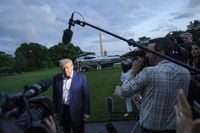In a bold move that could reshape the landscape of the film industry, President Donald Trump announced on Sunday, May 4, 2025, plans to impose a 100% tariff on all movies produced outside the United States. This declaration, made via his Truth Social platform, has sent shockwaves through Hollywood and beyond, as industry experts and foreign leaders grapple with the implications of such a sweeping policy.
Trump's statement painted a dire picture of the American film industry, claiming it is "DYING a very fast death" due to foreign countries offering incentives that draw U.S. filmmakers away. He characterized this trend as a national security threat, stating, "Hollywood, and many other areas within the U.S.A., are being devastated." The president's rhetoric suggests a belief that foreign films are not merely entertainment but a form of propaganda that undermines American values.
In his announcement, Trump authorized the Department of Commerce and the United States Trade Representative to begin the process of instituting these tariffs. "WE WANT MOVIES MADE IN AMERICA, AGAIN!" he proclaimed, underscoring his commitment to reviving domestic film production.
However, the logistics of implementing such a tariff remain murky. Questions abound regarding whether the tariff would apply solely to theatrical releases or also to streaming content, and how it would differentiate between films produced by American studios but shot abroad. For instance, popular films like Deadpool, Wolverine, and the upcoming Gladiator II were shot outside the U.S. but produced by American companies.
Industry insiders have expressed concern about the potential ramifications of Trump's proposed tariffs. Philippa Childs, head of the U.K. media union Bectu, warned that the tariffs could be a "knock-out blow" to an industry still recovering from the impacts of the COVID-19 pandemic and recent labor strikes. She emphasized the need for swift governmental action to protect the vital film sector and its freelancers, stating, "The government must move swiftly to defend this vital sector, and support the freelancers who power it, as a matter of essential national economic interest."
Adrian Wootton OBE, Chief Executive of the British Film Commission, echoed these sentiments, noting the historical collaboration between the U.K. and U.S. film industries. He expressed hope for continued partnership despite the concerning announcement, stating, "We will be meeting with Government and our industry policy group in the coming days to discuss further."
The proposed tariffs come at a time when American films still dominate global markets, generating $22.6 billion in exports and a $15.3 billion trade surplus in 2023, according to the Motion Picture Association. Despite this, the domestic film industry faces significant challenges, including a 26% drop in production since 2021, driven by the pandemic, labor disputes, and wildfires in California.
In response to Trump's announcement, foreign leaders have expressed caution. New Zealand Prime Minister Christopher Luxon stated that his government is waiting to see the details of the proposed tariffs but affirmed the country's commitment to being a top global destination for film production. Australia’s Home Affairs Minister Tony Burke echoed this sentiment, asserting that the rights of the Australian screen industry would be staunchly defended.
Trump's call for tariffs aligns with his broader protectionist policies, which have seen him impose a 145% tariff on certain Chinese imports and a 10% baseline tariff on various global goods. This latest move appears to be an extension of his efforts to bring manufacturing and production back to American soil, a theme that has resonated with his political base.
However, trade experts caution that such tariffs could provoke retaliatory measures from other countries, complicating existing distribution agreements and potentially leading to legal challenges in international trade courts. The Motion Picture Association has yet to comment officially on the proposal, leaving the industry in a precarious position as it navigates the complexities of global production.
As the film industry braces for the potential impact of Trump's proposed tariffs, the question remains: will this move ultimately protect American filmmaking, or will it hinder the very industry it aims to revive? With election season heating up, Trump's focus on Hollywood could serve as a flashpoint in his campaign, highlighting the intersection of culture, commerce, and nationalism on the big screen.
In conclusion, the proposed 100% tariff on foreign-made films represents a significant shift in U.S. trade policy, with far-reaching implications for the global film industry. As the world watches closely, the outcome of this initiative could redefine the future of filmmaking, not just in America, but across the globe.




